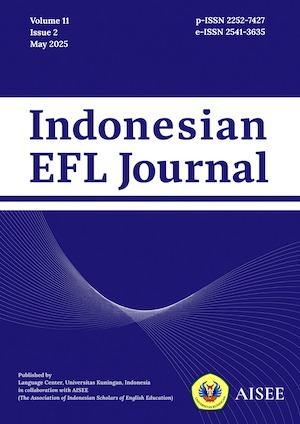THE IMPACT OF CRITICAL THINKING ON LEARNERS’ EFL VOCABULARY RETENTION: THE ARAB CONTEXT
Abstract
This experimental study aimed to investigate the impact of a critical thinking based pedagogical approach on learners’ retention ability of EFL vocabulary. There were two groups in the study: an experimental and a control group. The experimental group received vocabulary instruction with a critical thinking-based approach whereas the control group was taught in the conventional methods of vocabulary teaching. The treatment consisted of seven lessons delivered over 12 weeks. At the end of the treatment, the immediate posttest was administered and two weeks after the immediate posttest, the delayed posttest was administered. The resulting data were subjected to descriptive and inferential statistical analysis using SPSS software. The results showed that the experimental group outperformed the control group. Based on these results, the researchers concluded that the adopted critical thinking-oriented language instruction to EFL vocabulary has a positive effect on vocabulary retention, with implications for policy-makers, teacher trainers and teachers.References
Ab Kadir, M. (2007). Critical thinking: A family resemblance in conceptions. Education and Human Development, 1(2), 1-11.
Ab Kadir, M. (2009). Rethinking thinking schools, learning nation: Teachers' and students' perspectives of critical thinking in Singaporean education. Unpublished Dissertation. Melbourne.
Abudawood, E. (2015). Saudi Arabian students' perceptions of the importance of critical thinking in their learning experiences in institutions of higher education in the Philadelphia region in comparison to their Saudi Arabian educational experience. Unpublished Dissertation. Saint Joseph's University. Retrieved from http://search.proquest.com/docview/1781948761?accountid=142908.
Al-Gabrey, W. (2007). The impact of utilizing brain storming method in developing the critical thinking & academic achievement of the secondary school first grade in mathematics curriculum. Unpublished Dissertation. Umm Al.qura University, Makkah.
Alghamdi, E. (2014). An investigation of the efficacy of multimedia glosses in incidental EFL vocabulary learning and retention through playing an online hidden-object game. Unpublished Dissertation. The Graduate School of Missouri State University.
Al-Masrai, A., & Milton, J. (2012). The vocabulary knowledge of university students in Saudi Arabia. TESOL Arabia Perspectives, 19(3), 13-19.
Atkinson, P., & Silverman, D. (1997). Kundera's immortality: The interview society and the invention of the self. Qualitative Inquiry, 3(3), 304-325.
Atkinson, R. C., & Shiffrin, R. M. (1968). Chapter: Human memory: A proposed system and its control processes. In K. W. Spence, J.T. Spence (Eds.), The psychology of learning and motivation (pp. 89-195). New York: Academic Press.
Chang, A. C. S. (2015). A Japanese word association database of English. Vocabulary Learning and Instruction, 4(1), 47-57. doi: 10.7820/vli.v04.1.chang.
Clark, M. K., & Ishida, S. (2005). Vocabulary knowledge differences between placed and promoted EAP students. Journal of English for Academic Purposes, 4(3), 225-38.
Cook, V. (2008). Second language learning and language teaching (4th ed.). London: Holder Education.
Craik, F., & Lockhart, R. (1972). Levels of processing: A framework for memory research. Journal of Verbal Learning and Verbal Behavior, 11(6), 671-684.
Elyas, T., & Al-Zahrani, B. (2017). The implementation of critical thinking in a Saudi EFL context: Challenges and apportunities. Indonesian Journal of English Language Teaching and Applied Linguistics, 1(2), 133-141.
Facione, P. A. (1990). Critical thinking: A statement of expert consensus for purposes of educational assessment and instruction. Retrieved on March 1, 2019 from https://www.scirp.org/(S(351jmbntvnsjt1aadkposzje))/reference/ReferencesPapers.aspx.
Golonka, E., Brugman, C., Bowles, A., Silbert, N., Kramasz, D., Richardson, D., Corbett, R., & Doughty, C. (2012). Foreign language vocabulary: Effective practices for learning and teaching. University of Maryland, Maryland: CASL. Retrieved from https://criticalelt.wordpress.com/2017/04/16/foreign-language-vocabulary-effective-practices-for-learning-and-teaching/.
Hedge, T. (2000). Teaching and learning in the language classroom: A guide to current ideas about the theory and practice of English language teaching. Oxford: Oxford University Press, USA.
Joe, A. (1998). What effects do text-based tasks promoting generation have on incidental vocabulary acquisition? Applied Linguistics, 19(3), 357-377.
Judith, W. S., Susan, F. C., & Robert, G. (1985). Thinking and learning skills: Relating instruction to research. New York and London: Routledge Taylor and Francis Group.
Lai, E. R. (2011). Critical thinking: A literature review. Pearson's Research Reports, 6, 40-41.
Lee, H. W., Lim, K. Y., & Grabowski, B. L. (2008). Generative learning: Principles and implications for making meaning. In M. J. Spector, D. M. Merrill, J. van Merrienboer, & M. P. Driscoll (Eds.), Handbook of research and educational communications and technology (3rd ed.). New York, NY: Taylor & Francis Group.
Mall-Amiri, B., & Sheikhy, F. (2014). The comparative impact of autonomy and critical thinking on EFL learners’ writing achievement. Theory and Practice in Language Studies, 4(5), 903–916. Retrieved from http://doi.org/10.4304/tpls.4.5.903-916.
Milton, J. (2006) Language lite? Learning French vocabulary in school. Journal of French Language Studies, 16(2), 187-205.
Nation, ISP. (1983). Testing and teaching vocabulary. Guidelines, 5(1), 12-25.
Nation, ISP. (2006). How large a vocabulary is needed for reading and listening? The Canadian Modern Language Review, 63(1) 59-82.
Nixon, S., & Fishback, J. (2009). Enhancing comprehension and retention of vocabulary concepts through small-group discussion: Probing for connections among key terms. Journal of College Science Teaching, 38(5), 18-21. Retrieved from http://search.proquest.com/docview/200387909?accountid=142908.
Rafi, M. (2011). Promoting critical pedagogy in language education. International Research Journal of Arts and Humanities, 39(39), 63–73.
Read, J. (2000). Assessing vocabulary. Cambridge: Cambridge University Press.
Rodgers, C. (2002). Defining reflection: Another look at John Dewey and reflective thinking. Teachers College Record, 104(4), 842-866.
Schmitt, N., Schmitt, D., & Clapham, C. (2001). Developing and exploring the behavior of two new versions of the vocabulary levels test. Language Testing, 18(1), 55-88.
Scriven, M., & Paul, R. (2004). Defining critical thinking. Retrieved on March 29, 2019 from https://www.criticalthinking.org/pages/defining-critical-thinking/766.
Shore, R., Ray, J., & Gooklasian, P. (2015). Applying cognitive science principles to improve the retention of science vocabulary. Learning Environments Research, 18(2), 233–248. Retrieved from http://doi.org/10.1007/s10984-015-9178-1.
Webb, S. A., & Chang, A. C. S. (2012). Second language vocabulary growth. RELC Journal, 43(1), 113-126. Retrieved from https://doi.org/10.1177/0033688212439367.
Webb, S., & Chang, A. C. S. (2015). How does prior word knowledge affect vocabulary learning progress in an extensive reading program? Studies in Second Language Acquisition, 37(4), 651-675. doi:10.1017/S0272263114000606.









